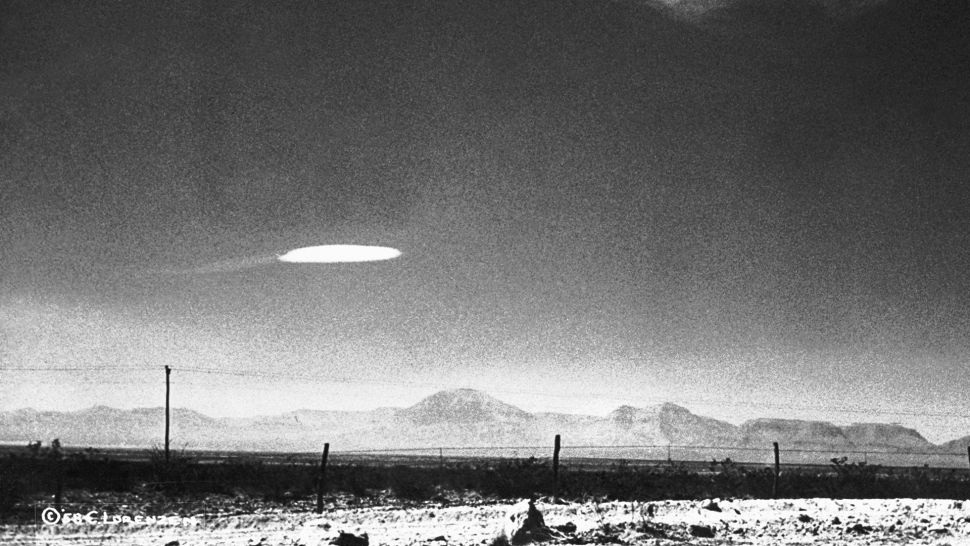The clues about the aliens in 2021 confuse the scientific world
UFOs are real

U.S. government employees photograph a UFO hovering for 15 minutes near the Holloman Aeronautical Development Center in New Mexico, U.S., on December 16, 1957
In June, the Pentagon released a much-anticipated report, documenting a total of 144 encounters with unidentified flying objects (UFOs) between 2004 and 2021. The report aims to assess the "threat posed by the threat posed by unidentified flying objects (UFOs)." caused by unidentified phenomena (UAP)" and officially confirmed human sightings of UFOs that had previously only been shared through the media.
The nine-page review confirms that "most reports of UAP can represent physical objects," from birds, balloons, drones, to surveillance equipment and dark projects. secret of the US government.
Although the report does not acknowledge any of these encounters involving aliens or supernatural objects, those who believe in this theory say this is just the beginning of the government. America in admitting the presence of a "third power".
Black holes may be related to aliens

While scientists spend a lot of time searching for habitable planets beyond our Solar System, a study published in July in the journal Monthly Notices of the Royal Astronomical Society. warns that nature's most exotic object should not be overlooked: a black hole.
Because black holes emit 100,000 times more energy than a star like the Sun, they could become attractive targets for alien civilizations, the study authors say.
To do this, aliens can use a high-tech structure called a Dyson sphere - an energy-absorbing structure first proposed in the 1960s, to steal energy from matter. orbits the black hole's horizon, then sends that energetic radiation out into space.
Habitat is different from Earth

Searches for extraterrestrial life often begin by placing in the "sight" planets with Earth-like structures. However, the possibility that there may be another alien environment is also conducive to life.
A study published in the Astrophysical Journal in August said that the "Hycean" planet, 2.5 times larger than Earth and covered by a giant ocean beneath a hydrogen-rich atmosphere, could be the point ideal for life.
In fact, microorganisms already thrive in some of the Earth's most extreme environments (such as hydrothermal vents).
The authors say such planets are likely to harbor tiny life beneath the waves. This understanding opens up a whole new avenue of discovery for scientists in their search for extraterrestrial life.
One of Saturn's moons has potential for life

A study in June suggested that methane spewing from Enceladus, Saturn's sixth-largest moon, could be a sign of life lurking on the moon's seafloor.
In 2005, NASA's Cassini Saturn orbiter discovered groundwater from faults near Enceladus' south pole. They are thought to have come from a giant ocean hidden beneath the moon's icy crust.
Many other compounds, including dihydrogen (H2) and a variety of carbon-containing organic compounds, including methane (CH4), also occur in these waters.
'Animal waste' discovered on Venus

In December, researchers from Cardiff University, MIT and Cambridge University (USA) discovered that ammonia exists in clouds on Venus - located about 38.2 million km from Earth.
This is inherently a substance that cannot be found in nature on Venus. Therefore, its appearance is suspected to be caused by some life form, with the hypothesis that there was a series of chemical reactions that neutralized the sulfuric acid droplets that are always present in the atmosphere of the planet. this planet, and turn it into a habitable environment.
Scientists believe this conclusion is because ammonia is inherently a waste product left over by animals in liquid form on our planet. However, on Venus - where it is so hot that it is thought that it is very unlikely that living things can exist (up to 462 degrees Celsius on average), tiny bacteria like Earth's bacteria may have had to "stay" in the clouds.
- Planets bear thousands of billions of lightning every hour and clues about aliens
- Aliens under the eyes of scientists
- Unveil the 'hot spot' that easily encounters the world's most aliens
- How did humans find the existence of aliens?
- How often do aliens 'hunt' humans?
- If aliens really contact us, what will happen?
- The adventurous world sends more messages to aliens
- The teeth of tyrannical dinosaurs confuse the scientific world
- Add 'eyes' to find aliens
- Mysterious places given to aliens
- Inventing strange monsters exclusively for aliens
- The reasons seem ridiculous but very convincing about not finding aliens
 Google Maps detects 8 strange bases of aliens?
Google Maps detects 8 strange bases of aliens? Have seen aliens on the moon?
Have seen aliens on the moon? The clearest photo of a UFO released in 32 years
The clearest photo of a UFO released in 32 years Shock: The truth about aliens in Region 51 is exposed
Shock: The truth about aliens in Region 51 is exposed